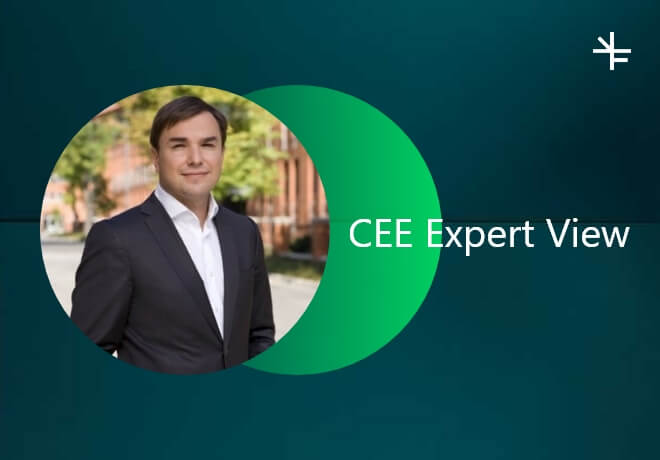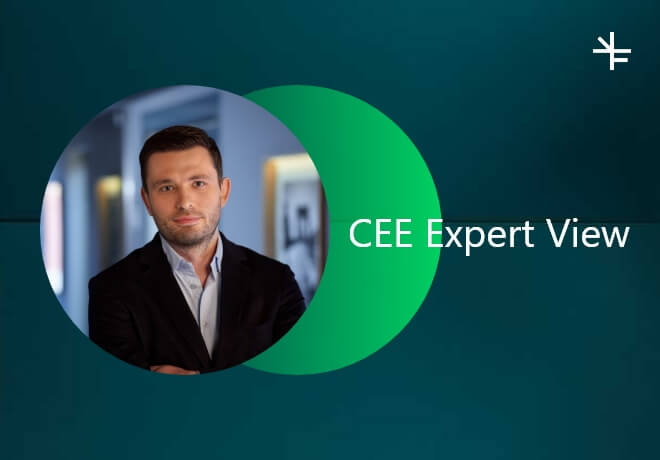11 . 04 . 2022
EXPERT'S VIEW Romanian market in 2022 - M&A and the domestic specificity
11 . 04 . 2022
Romania is among the CEE region’s fastest growing economies with an estimated GDP growth rate of 4.2% in 2022. In 2021, the country also saw a steady increase in the M&A activity similar to that of the neighboring countries, but not without local specificity. We asked Bogdan Chirita, Investment Director at Value4Capital, to share his outlook on the Romanian M&A and describe what V4C – as a private equity fund – focused on in the post-pandemic market reality.
How big was the M&A market activity in 2021 compared to 2020 in Romania?
According to public sources (EY) the market grew to 6.2 bn USD (from 5.2 bn USD in 2020), a 38% increase, and totaled 178 transactions. A good portion of these deals in 2021 are atypically large deals (such as the acquisition of ExxonMobil’s participation in the Neptune Deep gas project by Romgaz for 1.1 bn USD, the 46% acquisition of the remaining Globalworth shares by the Luxembourg vehicle CPI Property Group for 0.85 bn USD). The majority of the deals (>90%) were strategic purchasers, while approximately 15 were driven by financial buyers or private capital.
What are the predictions for the Romanian market in 2022?
A couple of trends should continue to dominate the M&A landscape in Romania for 2022, caveated obviously by the recent invasion of Ukraine, which may significantly disrupt activity in the short and potentially medium term:
- Globally: post-Covid-driven demand rebound and growth, dampened somewhat by inflationary pressures, should provide a good backdrop to deal activity across many sectors;
- Romania – and EU – specific: investment in infrastructure – the EU Resilience Plan, where a good portion of the funding would go green energy transition and digitalization, should continue to support deal making in these areas
- Romania – and CEE – specific: the trend to re-shoring of some manufacturing capabilities from SE Asia (and of late the CIS region) may create opportunities for production platforms to sell out to incoming strategics.
Which sectors consolidated most actively in Romania?
In terms of sector consolidation, most businesses are feeling the pressure to scale and achieve economies of scale in an increasingly competitive environment. Few sectors are immune. In the framework of what V4C is looking at, we see the following:
- The medical space continues to consolidate with the leading players, and especially MedLife, leading the charge to add local or specialized players to their network;
- Agriculture, both in the operation of farms and among input providers space, grows in sophistication, necessitating greater scale;
- Green energy, where acquisitions or other development moves are expected to evolve in 2022 as the sector matures; and
- The tech sector (digital enablers of the economy or process automation) either as VC or growth capital investments, as the winners emerge and portfolios of services are built under one umbrella.
In our recent CEE Expert Report we wrote that a new trend was observed in Romania in 2021 of entrepreneurs staying as companies’ managers even after 100% buyouts, not only for a determined handover period, but for the long term. Can you refer or elaborate on it?
The answer is more nuanced, and it depends on the size of the company, the maturity of the sector, and the type of purchaser (Private Equity or Strategic).
 In theory, for Strategic players and 100% buyouts a handover period is customarily linked to some form of earn-out. Cooperation can continue if targets are met or the business is specific enough that Founder Manager is important for the stable growth of the company. We do often see a natural change in the focus of the Founder Manager as she continues: with their own money from the sale, thoughts often return to not having to report to someone and the freedom to pursue one’s own ideas. Once an entrepreneur, always an entrepreneur.
In theory, for Strategic players and 100% buyouts a handover period is customarily linked to some form of earn-out. Cooperation can continue if targets are met or the business is specific enough that Founder Manager is important for the stable growth of the company. We do often see a natural change in the focus of the Founder Manager as she continues: with their own money from the sale, thoughts often return to not having to report to someone and the freedom to pursue one’s own ideas. Once an entrepreneur, always an entrepreneur.
For PEs there are a couple of specific cases:
1) The Founder Manger is present in the business, has not delegated day-to-day management and there is no structure below him. In this situation, in a 100% buyout the entrepreneur would be kept for a longer period of time, until the structure is built, a successor is identified and she/he gradually phases-out of daily operations. If the buy-out is partial (majority/minority buyout), the Founder is probably viewed as essentially and would be kept (barring underperformance, etc.) throughout the holding period (medium term 3-5 years).
2) Founder Manager has built the structure and processes and is less involved in the daily management. In this case, the replacement of the Founder is easier and the time can be shortened. In the case of 100% buyouts, immediate replacements might be identified and brought in as a key part of the PE’s value build plan. In other cases, more often, there is a transition period and the Founder Managers move into a more Strategic, board-like role fairly quickly.
For all of the above, the size of the company (which equates in many cases with the presence of a real management structure) matters and will drive the decision to keep or not the Founder Manager on board for a longer period of time.
Looking from the perspective of Value4Capital, we rarely take an Founder manager fully out. For PE, it is a transition, which is often lasts through the PE’s holding period. We also see and are ready to support many founders who want to use PE as a stepping stone to longer term ownership. They need capital or want to take some money off the table now but have no intention of ceding control or ownership in the mid-term.
Medlife, in many ways a family business, is an example where PE was a bridge to a listing and continued ownership by the Marcu family. Especially in younger, tech oriented companies, the now second generation founders (the first being business founders/owners of the 1990s/2000s) want to stay and minority stakes are more and more on offer to PE. We are looking at these actively — going back to more growth deals with founders inherently involved.
As a Private Equity fund, what did V4C focus on in 2021?
We split our time between portfolio and new deals.
Last year, we worked on doing deals to finish investing our current fund, V4C Poland Plus. We still have capacity to do between 2-4 deals and keep some money in reserve for follow-ons. We looked at a range of opportunities, both in Poland, Romania and other neighboring markets, but did not find a target that met our criteria. That criteria includes price, where last year, in retrospect the top of the cycle, was in our view very pricey.We now have a couple of deals which are progressing, and we aim to sign one Romanian deal in the first quarter of 2022.As well, the Romanian office was busy managing the investment we did before Covid-19 in Hungary, Doktor24, by supporting the integration of acquisitions done in 2020 (March and August) as well as signing and closing two acquisitions in 2021 and early 2022.
Did you like the article?

Bogdan joined V4C in 2012, bringing in his experience from 7 years of work in leading international audit and consulting companies. Bogdan started working in the audit department in Deloitte in Bucharest. At V4C, Bogdan deals with acquiring new investment projects, carrying out transactions and monitoring portfolio companies.
Do you want to exchange knowledge or ask a question?
Write to me : Bogdan Chirita page opens in new window
Share confidential company data securely . Try out FORDATA VDR free for 14 days
START NOW Get your trial version for free-
01 . Cautious optimism for M&A in CEE amid global challenges

Much like the rest of Europe, CEE has been moving in line with global trends, experiencing a downturn in economic activity. The first half of 2024 proceeded largely as expected, with no major surprises in the mergers and acquisitions industry.
12.07.2024
-
02 . DACH M&A in 2024 - will the rising wave return?

Explore how dealmakers in the DACH region continue to leverage M&A as a strategic tool amidst evolving business landscapes, including the impact of AI and sustainability. What does 2024 hold for this dynamic market?
03.04.2024
-
03 . Trends in M&A market in CEE in 2024 through the eyes of buyers

Market sentiment in Central and Eastern Europe (CEE) M&A market in 2024: a blend of cautious optimism, enthusiasm, and significant risk aversion.
08.03.2024
-
04 . Expert Comment from Fordata on the Real Estate Index Poland, 4Q 2022 report

In the last quarter of 2022 and the first months of 2023, we finally witnessed a revival in the real estate market. What does the real estate market look like?
25.05.2023
-
05 . The war in Ukraine and its repercussions

The unprovoked full-scale invasion of Ukraine launched by the Russian aggressor on 24 February 2022 has had tremendous local and global repercussions in all areas of life.
10.11.2022
-
06 . Private Equity in the CEE - Hinting at Possibilities in Near Term by Driving Innovation and Inclusion

Sourabh Biswas at OakNorth Bank writes about the latest revelations in the global and European PE/VC market. How is private equity in CEE?
12.09.2022
-
07 . Why is it worth investing in a professional VDR?

Investing in the purchase of a business is a risky undertaking. Therefore, it is extremely important to have a group of advisers by your side who will support a…
25.04.2022
-
08 . ESG: A new Framework in the Making - New requirements and how they (probably) fit into each other

Sustainability and activities aimed at reducing the carbon footprint are currently at the top of the political agenda in virtually every major ec…
16.12.2021
-
09 . Good practices in the field of compliance - what fintechs can learn from traditional financial institutions

Aleksandra Kopeć focuses on compliance and points out the differences between their application in traditional finance and fintechs.
01.09.2021
-
10 . Germany's Transparency Register - what does it mean to companies?

Dr. Jan J. Kruppa explains how EU AML Directives apply to German law and what new regulations bring to the local entities.
24.08.2021
-
11 . PE/VC funds' activity in H1 2021 - The USA and the EU

Harmeet Dhiman takes a look at PE/VC activity in the United States and Europe. How is it after the first half of the year 2021?
22.07.2021
-
12 . What are the challenges of the FinTech industry?

The challenges of fintech are not just online security. What is fintech after the pandemic like, explains Aleksandra Kopeć, financial lawyer.
18.05.2021
-
13 . The role of the CFO in mergers and acquisitions - has it changed?

Financial directors have faced the big challenge of managing company’s funds in the uncertain reality caused by the coronavirus …
22.03.2021
-
14 . Audit during the pandemic - how has it changed?

The epidemic has had a significant impact on the economy and the functioning of companies, therefore its effects…
27.01.2021


